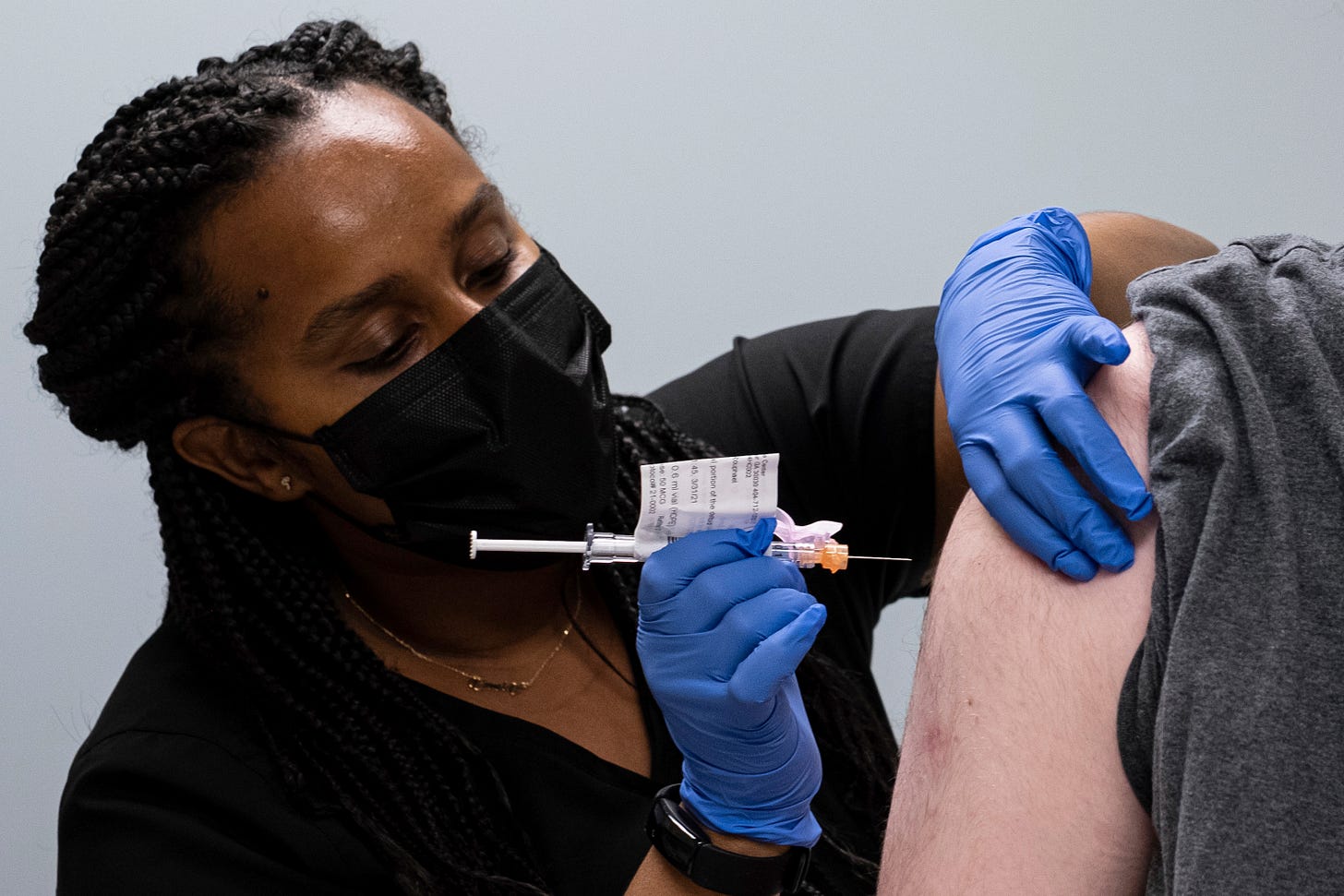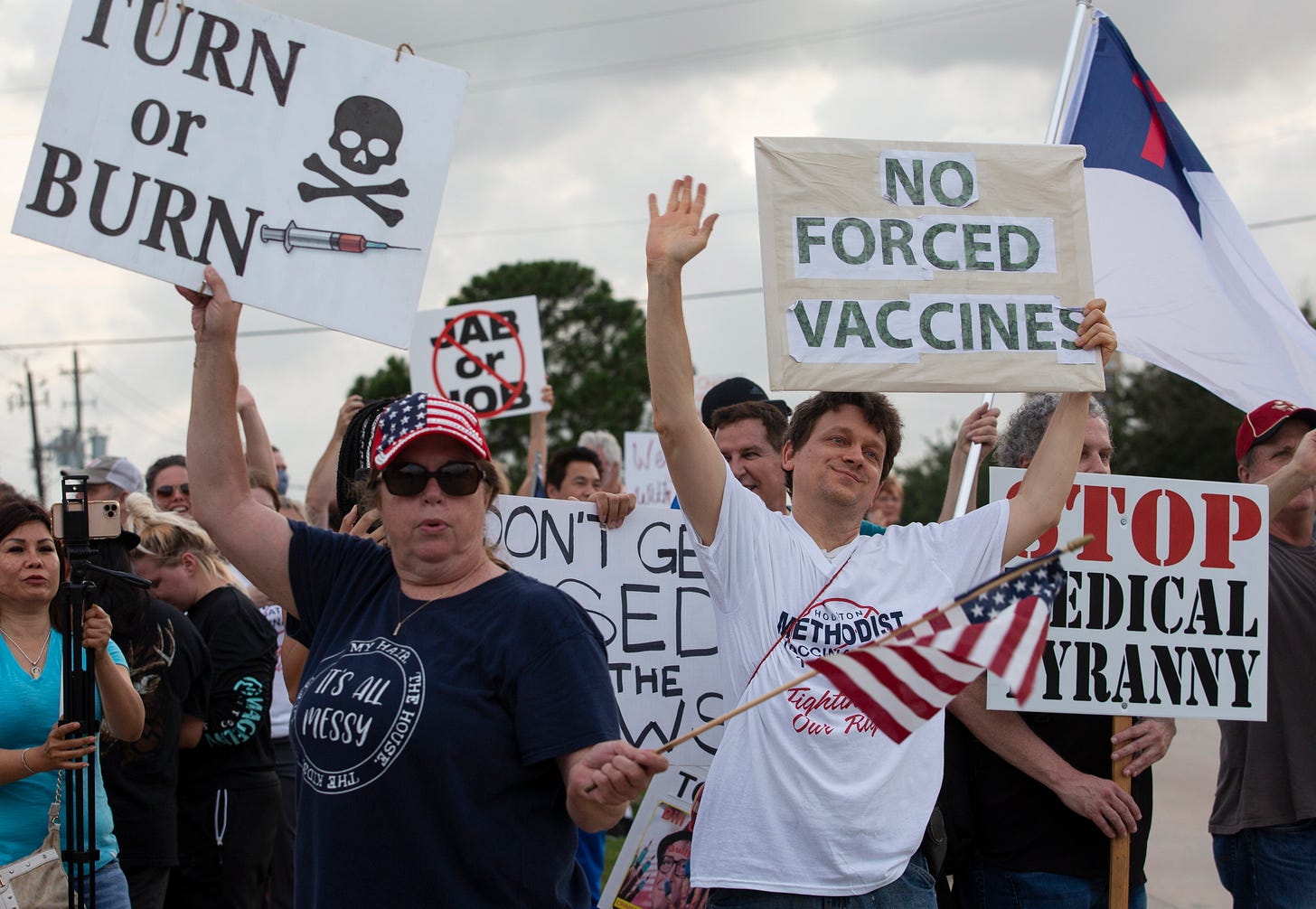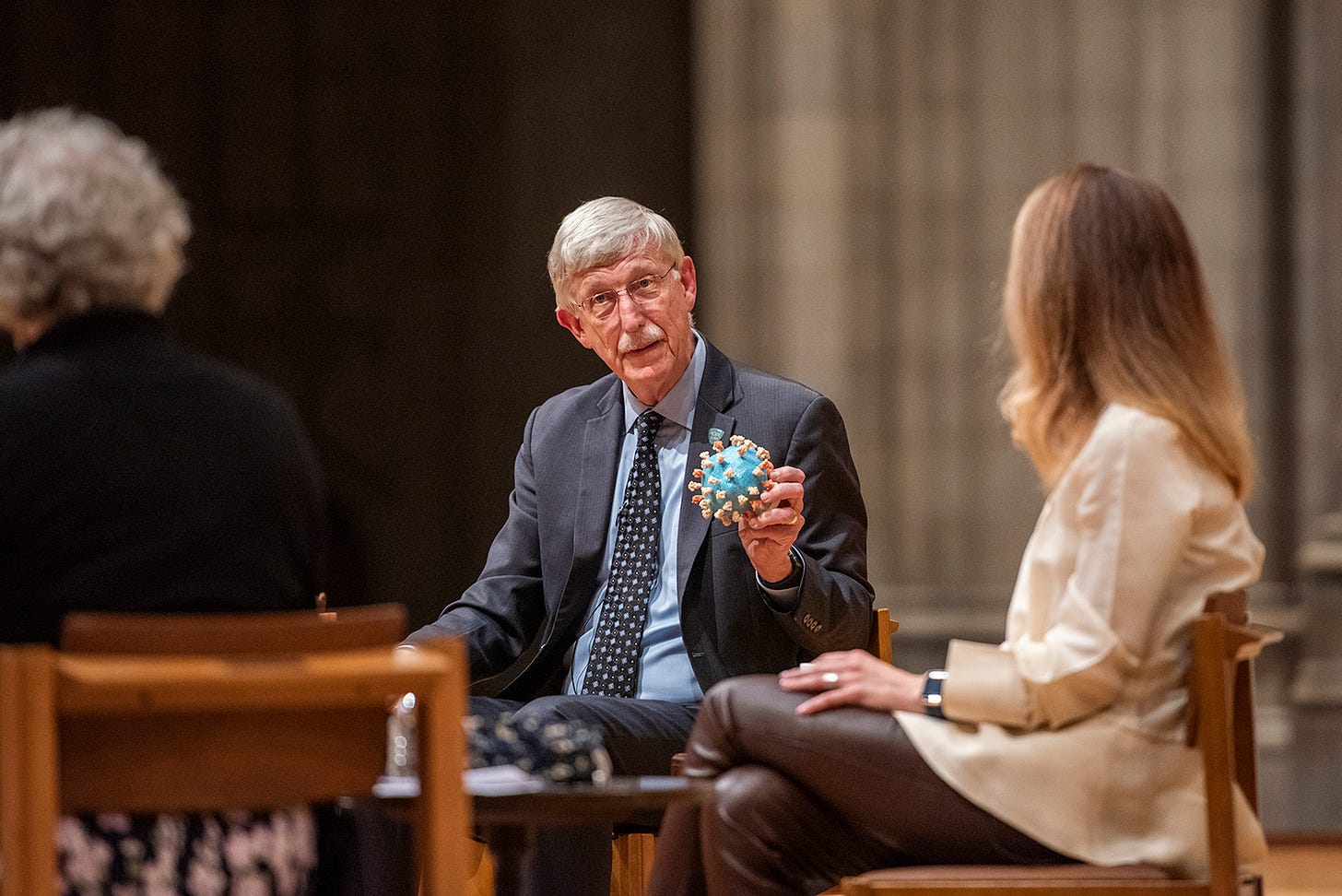Vaccine Convictions
This is a bonus edition of A Public Witness. If you are only signed up for a free account and like what you read, please consider subscribing today. For just $5 a month, we’ll deliver insightful analysis about religion, politics, & culture to your inbox every Thursday. Please spread the word by forwarding this to a friend (or twelve).
John Scopes lost in court.
That fact often escapes our collective memory about the events that unfolded in Dayton, Tennessee, back in 1925. The showdown over teaching evolution in public schools resulted in the conviction (later overturned) of the science teacher. The fundamentalists won in the courtroom but were defeated in the battle of public opinion. Reporting from the trial and later depictions of the events, such as the film Inherit the Wind, told a very different story about scientific progress triumphing over outdated religious thinking.
In reality, the trial portended a century-long conflict between segments of American Christianity and modern science. As Jeffrey Moran, a historian of the Scopes trial, explained, it represented a “popular disdain for expertise and scientific ‘elites’ that is still with us — often to our detriment, as when we ignore expert advice on fighting against the coronavirus pandemic.” Some of this contempt can be likely be traced back to the inflammatory national coverage of the trial that framed rural America as backwards “yokels” worthy of mockery.
In this bonus edition of A Public Witness, we look at vaccine hesitancy among Christians, especially White evangelicals. We consider its causes and ways of addressing it. With the spread of the Delta variant raising alarms, time is short for convincing these skeptical followers of Jesus to protect themselves and others by getting vaccinated.

A Perfect Storm
Multiple polls reveal a disproportionate amount of vaccine hesitancy among White evangelical Christians. The instinctual response for many non-Christians and non-evangelical Christians alike is frustration, blame, and shame. Failing this moral test puts others at risk. Many vaccinated people are angry at such obstinance from the unvaccinated Christians who usually claim to care about righteousness.
As noted above, there is a long history of anti-scientific thinking within White evangelical and fundamentalist Christian communities. A poll last year from the Pew Research Center found lower rates of support for scientists among White evangelicals than other Protestants, even after controlling for party identification and schooling (i.e. the difference cannot be explained away by political ideology or differences in educational attainment).
For complicated reasons that may be historical, cultural, theological, and ideological, this group of Christians is less trusting of mainstream science than others. It is a story that has played out over evolution, climate change, and now the coronavirus. This anti-intellectualism neither needs to be fully explained nor condoned here, but its reality needs to be acknowledged.
Similarly, many White evangelicals share a historic distrust of government. Relatively disorganized prior to the 1970’s, the Religious Right emerged in opposition to the federal government’s denial of tax exemptions to segregated schools. The issues have changed over the years but the opposition to state intervention, in most cases, has not. Whether it is a small government ideology shared with other conservatives or a more acute fear of the government threatening their “religious liberty,” conservative White evangelicals are generally dubious of the government’s effectiveness and involvement.
When you combine these attitudes of suspicion towards government and skepticism of science together, hesitation towards COVID-19 vaccines among White evangelicals should not be surprising but expected. A new medication utilizing breakthrough technology that was developed with the government’s support at unprecedented speed? What many celebrate as an advancement is instinctively eyed warily among this group.
As if all that wasn’t enough, White evangelicals have demonstrated a greater openness to conspiratorial thinking. A survey by the conservative American Enterprise Institute found belief in QAnon to be highest among White evangelicals relative to other religious groups. Earlier data from the political scientists Paul Djupe and Ryan Burge revealed similar findings. Thus, it is no surprise that a variety of conspiracy theories related to vaccines and religion are circulating.

Distrust of government, disbelief in science, and a penchant for conspiratorial thinking are a dangerous mix, especially in a social media age where disinformation is big business. Not every unvaccinated White evangelical fits this description completely but many do, at least in part. The path to increasing inoculations in this community begins by understanding these factors.
Pastors to the Rescue
“Permission structure” is a marketing concept describing how advertisers can use their influence to encourage consumers to make purchases they might otherwise forego. The basic idea is helping people move from “no” to “yes” through appeals to reason and values.
White evangelicals and other Christians hesitant about getting the vaccine for the reasons outlined above are not likely to be persuaded by scientists or political leaders alone. If you are concerned about the science behind the vaccine, then assurances from the scientists who made it are not likely to go very far. Despite the Trump Administration’s efforts to create the vaccines and receive the credit for doing so, there is a negative correlation between county vaccination rates and support for the former president.
Yet, nearly half of unvaccinated White evangelicals have told us who could change their mind: their pastors.
One poll in South Dakota found that an individual’s pastor, doctor, or pharmacist held the most influence among vaccine skeptics. This is not a surprising result. Your doctor might not be an infectious disease expert, but they are the scientists you know (and they know you). The power of these relationships is that people trust both the wisdom and motivations of these caregivers. A parishioner knows the love of their pastor for them. Many patients have spent years having their well-being looked out for by the same doctor.
Ministers have a unique role to play here. A doctor can vouch for the vaccine’s safety and effectiveness. A pharmacist has the training to deliver the shot and can even say, “this is good for your health.” Pastors are neither medical experts nor capable of directly giving you the vaccine. Their job is opening previously closed doors in a very specific way.
Among other things, clergy are moral guides. A Christian committed to following Jesus trusts their pastor to provide edifying direction in accomplishing that goal. The minister has studied and disciplined themselves in this way, allowing them to authoritatively teach others. When a pastor says, “this is what following Jesus looks like now,” their congregation members give their words great moral weight.
We know this truth from our own experience. We also believe that getting vaccinated is a way to obey Jesus’s command to “love your neighbor as yourself” (Mark 12:31). And we believe that, given the current ineligibility of those under 12 to be vaccinated, getting vaccinated is a way to heed his admonition against causing “little ones to stumble” (Matt. 18:6).

With COVID-19 cases spiking in our home state of Missouri (and hospitals again being overwhelmed), we felt compelled to act. That’s why we organized a clergy sign-on statement pleading with Christians to get vaccinated as an act of discipleship. More than 200 pastors and ministers across the state endorsed it within just a few days. That effort drew national news coverage (and attention in Missouri as well, where our message most needs to be heard).
We believe clergy have a key role to play in persuading — in giving permission for — people to get vaccinated, not only because of public health but also because of what they believe to be true about God, Jesus, and themselves. This moment is not just about trusting medical science enough to join millions of others in getting a shot. It is also about trusting Jesus enough to consider what our neighbor — the immunocompromised, the overwhelmed health care worker, the unvaccinated child — needs from us, and then expressing our love for them by honoring that obligation.
Doctors and pharmacists do not have the tools to convince Christians of that last part. Pastors, on the other hand, certainly do.
Overcoming a Different Hesitancy
Despite the potential of this moment, not every pastor is eager to speak out. Congregational leadership through the pandemic has exhausted many pastors. The extra work, new tasks, and controversies over restrictions caused many servants to look for an exit.
Ministers can read polling data too. Aware of the vaccine hesitancy in their pews, many White evangelical pastors presume they are limited in their ability to speak out.
“Pastors feel so constrained,” Dan DeWitt of Cedarville University told Christianity Today. “They want to take care of their people, but they know one careless comment could cost them.”
Others believe their efforts would be useless. As Nathan White, a Baptist pastor in rural Virginia, said in Politico, “If I put forth effort to push it, I’d be wasting my breath.”
These dynamics and pressures are real. Our clergy sign-on statement was also meant to provide a permission structure for pastors. There is strength in numbers. It is easier to stand in the pulpit and proclaim, “Other faithful Christians are offering this witness. I joined them in saying ‘every follower of Jesus eligible for the vaccine should get one.’ Let’s come together to defeat the pandemic.”
Sometimes ministers preach prophetic sermons knowing their words will fall on deaf ears. Or, they stir up controversy because of their own beliefs but without any urgent requirement to do so. They disrupt the proverbial apple cart out of conviction not because of what’s at stake.
This is a moment where their words, teachings, and exhortations could literally save lives. We fear that too many pastors are framing vaccination as a mere personal preference. Yes, Christians should gather all the facts (actual facts, from reputable sources). They should talk with their doctors about their eligibility for the vaccine.
But if there’s no abnormal risk, then we believe this moment rises to the level of a moral duty and Christian pastors should bluntly say so. They can take confidence knowing other pastors here in Missouri and across the country are doing the same.
Their message can echo pleas from evangelical Christians, Black church leaders, Pope Francis, and mainline Protestant denominations. Despite the opposition in some pews, the overwhelming witness of Christ’s Church — globally and nationally — is unified in encouraging vaccination.
If more support is needed, they can draw on the authority of Francis Collins, an evangelical medical doctor and scientist who leads the National Institutes of Health.

“I do think it is not a stretch to say, for all of us who’ve prayed for deliverance from COVID-19, the vaccines are an answer to that prayer,” Collins said last month. “That is very much consistent with the way God often responds to our needs — by working through human capabilities that we’ve been given as a gift by the Creator. Why wouldn’t you want to take that gift and not just look at it, but open it up and then roll up your sleeve?”
Or, they can look to the expertise of Emily Smith, an evangelical epidemiologist at Baylor University trying to spread the word about the importance of vaccinations to other believers who are hesitant. As she put it, “I just feel such a sense of obligation, especially from a Christian perspective, to be the Good Samaritan, and hopefully get people to band together and still wear their mask and get a vaccine.”
“Get vaccinated!” is a sermon that needs to be spoken and heeded if we are truly going to put this pandemic behind us. Whoever has ears, let them hear.
As a public witness,
Brian Kaylor & Beau Underwood




Loyalty in the culture wars may be one reason if not the primary reason some evangelical pastors refuse to advocate for vaccinations. For one hundred years, certainly since the Scopes Trial, when the fundamentalist fight over modernism moved from the academy to the parish, pastors carried the fight forward. The fundamentalist movement is committed to a false dichotomy: a non-scientific world view that forces its followers to swallow and regurgitate all sorts of nonsense for no other reason than science is the enemy in this front of the war. I have no doubt that your data on the influence of pastors is correct. Thousands of sheep flock to these pastors and hang on their every word. What else are parishioners going to do if pastors tell them outside sources of knowledge come from enemy communities pushing a contrary world view.
What pastors fail to acknowledge is that congregants can do their own research. The science currently tells us their is a virus, it is deadly for less than 1 percent of the population, there are many with natural immunity (long believed to be better than forced immunity), there is a vaccine and it is the best line of defense for the elderly and health compromised, there are side effects, some known, many unknown. There is a need to weigh the risks and effectiveness of this vaccine on society and individuals. At the heart of all of this are people with God given liberty and intelligence that want to do the right thing for all involved but are being made to feel there is only one moral response -to get a vaccine for a virus with a 99.97% recovery rate. Why not let people act in the manner that best suits their God given liberty and conscience.